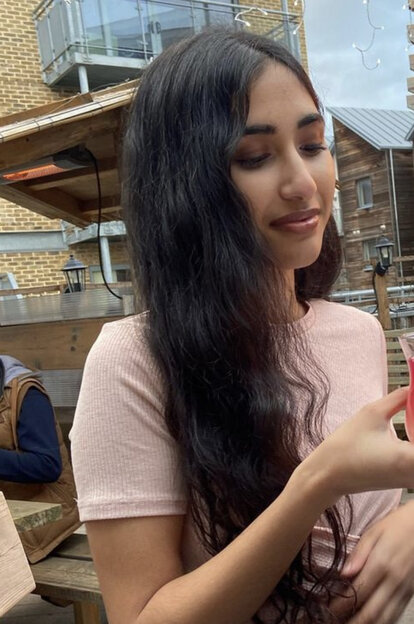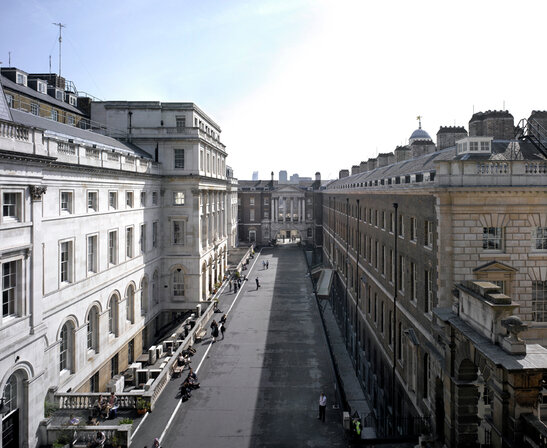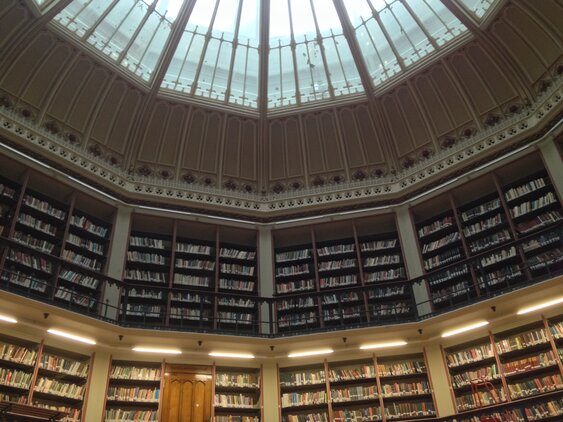Are you curious to see what it is like to study Economics at King’s College London?
Reading about a course only tells you so much, you do not get the reality that those who are studying it can provide.

What Is Studying Economics At KCL Like?
The poised white marble architecture of the Strand campus, the numerous coffee shops dotted within yards of proximity to one another other, the coalition of offices of thriving start-ups and large corporates – it does seem to be the perfect backdrop of the archetypal central-London Economics university student.
Although King’s Business Management and Accounting courses have stood firmly for quite some time, their pure Economics (BSc) is only in its infancy stages – it is less than ten years old.
Run as a joint effort by the Department of Political Economy and Business School within King’s, it aims to offer a fresh perspective on the practical applications of economics within enterprise and others, but also as a social science and its impacts on political theory over time.
Being part of two departments means double the benefits – societies, activities, exploring more parts of campus…albeit a greater amount of walking to and fro…
In first-year, the King’s Economics course itself is universal (there are no optional modules); therefore, it enables you to relate to your cohort and facilitates the exchange of ideas, which is particularly useful as you are still settling into university life.

Assessments range from essays to maths exams to analytical, data-driven coursework, and thus really develops proficiency in a wide range of skillsets. In the second and third years, you have the ability to choose from a wide range of optional modules – from political and trade to financial markets and the environment.
These modules really do blossom a fine cohort of aspiring Greta Thunbergs, Mark Carneys and Barack Obamas…However, in all seriousness, Economics does open many doors, not to mention studying Economics in London, the global financial hub at a world-class institution – it doesn’t take someone with 20:20 vision to notice what exceptional opportunities these doors may open.
Due to the pandemic, my first-year experience as an Economics student at KCL was a mere extract of the benefits my university and university life in general has to offer; only now, with lockdown easing, and as a second-year student, armed with a few more grey hairs and aches, do I feel that I am closer in proximity to the standard “university experience”.
Nevertheless, given the setbacks, I do feel like I maximised first-year as much as I could, and therefore, in the following, I share some of my key insights and learnings, which you may decide to use to do the same.
Our expert tutors are on hand to help guide you to a successful King’s College Application.
We help you craft the perfect Personal Statement, achieve a highly competitive TSA or TMUA score and teach you how to Interview effectively.
Discover our Oxbridge Economics Premium Programme.
What Does My Average Day Consist Of?
For me, my average day is structured around a list of tasks I make weekly for myself, which I create via a checklist on the ‘notes’ app on my phone (as a Gen-Z, it works for me perfectly as I am always on my phone! Also, the dopamine rush from ticking boxes after successfully completing tasks does wonders for my overall mood).
I schedule my week in order based around the following:
Timing is key.
Firstly, I note down the times of my compulsory seminars and in-person lectures. Essentially, these are things I must attend in person or be present for, accounting for the commute in either direction. While first-year me did not have to account for this due to everything being online, second-year me must plan for my commute, especially when the primary mode of transport from my accommodation to campus is an unreliable bus that goes through heavy central London traffic. Should you decide to come to King’s, I would recommend selecting your desired student accommodation as soon as possible, as well as the associated transport methods, and familiarising yourself with these well in advance of term.
Preparation.
Then, I base my studying so that the content is learnt a week ahead of seminars, saving me from the pain of sitting through a seminar and nodding like a puppet. For me, one of the game changers in second-year, especially as an Economics student who places a great value on efficiency, was investing in an iPad. Should you decide to purchase a tablet and a smart pen to supplement your studies, I can assure you that the process of notetaking and lecture slide-annotating will become a lot more exciting.
Immerse yourself in the local area.
There is a lot of scope for part-time work – the variety of coffee shops and restaurants near campus means the possibilities of part-time work are endless!! If you are planning to undertake part-time work alongside university, ensure that it is flexible around your studies – weekends are usually the safe option! First-year may allow for awkward and long hours but trust me when I say second-year and its notorious Microeconomics module (which I am still recovering from) will really test your multi-tasking ability to the limits.
Me time.
As much as university is an incredible experience to look back on, it can be immensely draining if you let it – alongside the workload, the influx of new people in first-year can take its toll. To allow for some me-time and ensure my body could cope with the physical challenges of freshers’ flu and mentally strenuous assessment periods, I ensured I designated a few hours at least three times a week towards sports and personal fitness. With lockdowns and tiers prohibiting bouts at the gym for much of first year, desperate times called for desperate measures – and ab workouts and weighted exercises on yoga mats in the student hall corridors sufficed. Now, I would opt for visiting the King’s Strand gym before or after seminars, or even participating in sports-related activities – in fact, some of my coursemates would attend our econometrics seminars and then kick away the pain of regressions and instrumental variables with an hour of Muay Thai!
Enhance your career aspirations.
I would then slot in extra-curriculars during the couple of hours between my other tasks. Personally, I tried to get involved in many projects, activities, and societies in first-year that I could fit in – these are excellent ways to boost your CV, especially when applying to jobs and internships later down the line in second-year. There is something for everyone, regardless of how obscure or unheard of the route is!!
Have fun.
Finally, make time to participate in social activities (many argue that these are the highlights of their time at university). Some notable events I attended in my first and second years were the Diwali Show and boat parties! Even if you are more introverted, first year is a good platform to network and get to meet as many people as you can – who knows when you may bump into them in the future! As many social activities tend to occur in the evening, give yourself plenty of time to recover. However, it is hardly uncommon for a first-year (or a second-year whose first-year experience got stolen by lockdown) to stumble into a 9 am with the sunken, sleep-deprived eyes of a politician the night before an election.
You may find yourself adhering to some or all of these – remember, this is just what worked for me, and is only a mere guideline!
Where Can I Study?
Fortunately, the Strand Campus is not a pretty spot for Instagram pics; it boasts home a wide range of facilities – perfect for studying.
There are many study areas dotted around campus – here are a few that I may suggest:
For a spot of light work to convince yourself of immense productivity or to even kill time between lectures and seminars, consider the Shack on the ground floor of Bush House. With the student union tuckshop nearby, it is a good way to fuel the intent of heavy-duty learning (regardless of whether that intent is seen through). Large windows and skylights allow for the few instances of British sunlight to seep in – the serotonin is much needed during exam periods.

Otherwise, the smaller study rooms on the eighth floor of Bush house make a good spot to prepare for group projects or even virtually attend seminars.
For a demure bout of delving into the compulsory core readings, you may want to visit the Maughan Library. Perhaps the ribbons of bookshelves, filled to the brim with classical to contemporary literature, may inspire you, hopefully causing that surge of motivation to complete your readings in time for your upcoming seminar.
Alternatively, if you are seeking a break from the business school students, especially if they serve as a constant reminder of your impending assessments and coursework deadlines, remember that King’s has 4 other campuses to choose from. I found myself studying at the library on Guy’s campus a few times and feeling a lot better about my own work once viewing the permanent pain of the Guy’s medical and dental students, as they make their way through sixty lecture slides.
Take a look through our collection of Day In The Life articles for more insight into university life:
Some Top Tips!
To exceed as an Economist at KCL, it really helps to have an idea as to where Economics fits into your future goals and career plans. While you are not expected to have such a clear-cut plan before attending university, university is an amazing way to clear the fog. To do this, maximise the available services such as scheduling meetings with the career counsellor, as well as joining many different societies and meeting different people you can learn from.
Try and stay on top of lectures!! While it is feasible to catch up on lectures during Reading Week and over the holidays/end of term, we have two exam periods, as well as mid-terms and other coursework and assessments in between terms. Therefore, to potentially avoid a catastrophic downwards spiral, it is best to do the work and readings when you get them, as well as attend the seminars, regardless of how eventful and late the night before was. A panda-eyed show-up to lectures is still better than none at all!!
Be proactive with your relationships with others, especially coursemates! Try to hang out with coursemates and really get to know them, especially in first semester, where you have more time on your hands – arrange coffee meet-ups or lunch with them, maybe study together on campus after your in-persons, or even attend different social events with them. Remember, these are the people who will understand the specifics of your stress during exam season, and also those you can rely on for help if you are unsure, or even notes in the occasion that you happen to miss a lecture or seminar!
Final Musings
Having attended offer holder days at other London universities such as LSE and UCL, as well as having friends who attend them and other universities known for their Economics courses, I can honestly vouch for King’s as a great institution in the field.
I think it has been amazing to witness the Economics department flourish in such a short space of time, and I am certain that it will continue to do so.
I hope this helped provide some preliminary guidance into what a day as a KCL Economics Student could resemble. Still, I urge you to read the KCL website more thoroughly and confirm that this is the university for you. I promise you will not regret it!
Whether you are applying for KCL, Oxford or Cambridge our expert tutors are on hand to help you.
Are you applying for Oxbridge as well as KCL?
Applying to Oxbridge is immensely competitive and it is crucial that you give yourself the best chance of success. We help you craft the perfect Personal Statement, achieve a highly competitive Admissions Test score and teach you how to Interview effectively – covering all areas of your Oxbridge application.
Discover our Oxbridge Economics Premium Programme.

